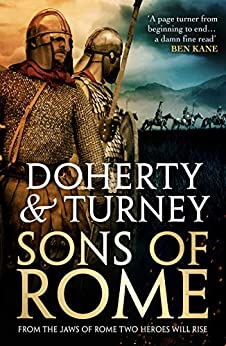
Blurb
As twilight descends on the 3rd century AD, the Roman Empire is but a shadow of its former self. Decades of usurping emperors, splinter kingdoms and savage wars have left the people beleaguered, the armies weary and the future uncertain. And into this chaos Emperor Diocletian steps, reforming the succession to allow for not one emperor to rule the world, but four.
Meanwhile, two boys share a chance meeting in the great city of Treverorum as Diocletian’s dream is announced to the imperial court. Throughout the years that follow, they share heartbreak and glory as that dream sours and the empire endures an era of tyranny and dread. Their lives are inextricably linked, their destinies ever-converging as they rise through Rome’s savage stations, to the zenith of empire. For Constantine and Maxentius, the purple robes beckon…
My Review
This was an amazing book! What we have is the early story of Constantine, when he was still trying to make his way in the world, interspersed with the story of Maxentius, who faces him on the battlefield at the very beginning of the book; the rest is a flash-back. The novel is written in first person by each of them, back and forth one chapter at a time; their memories are so different that I never got confused as to whose story I was reading. Both are sympathetic, and Constantine’s story didn’t really overshadow Maxentius. One is strong, the other is weak, but both prove to be integral to the crisis of their generation. I watched helplessly as they slowly found themselves on opposite sides, inexorably torn apart by their own destinies. In the late 3rd century, Diocletian has just divided the empire into its Tetrarchy, where the east and the west has its own Augustus and Caesar—four rulers in all, where Caesar was to be the heir of Augustus. In theory this may have toned down all the assassinations, but in practice it was a disaster and our protagonists find themselves in the middle; both are cheated from their intended position. Not only do we, the reader, find ourselves involved in the fortunes of these two characters, we are plunged into the everyday life of the empire’s ruling elite. And it’s not a pretty sight! The emperors range from nasty to despicable. These were the days when Christians were burned at the stake; Diocletian even condemned his own wife!
Another Joviani legionary stomped out of the tunnel and onto the arena floor, carrying a crackling torch. The crowd fell utterly silent as the soldier held the torch near the firewood then looked up to Diocletian. Maxentius and I looked on, the breath held captive in our lungs. We, like the rest of the crowd, were sure that the emperor would intervene, give his wife a reprieve. This was statement enough, surely?
At that moment, I noticed how Diocletian jolted in his seat, lurching forward as if shaken by some great moment of understanding. His fingers clasped the arms of his seat and his eyes grew wide. His lips opened as if to speak.
Free her, I mouthed, willing him to speak those words. I noticed Maxentius’ lips move likewise by my side.
Silence… then the emperor nodded to the torch-bearer and slumped back in his seat.
Nice guy! And he wasn’t the worst. After Diocletian retired, the Emperor of the East, Galerius, was ruthless, greedy, and sadistic; he proved to be the nemesis of both Constantine and Maxentius and seemed to get away with the worst atrocities. I couldn’t wait until Constantine took over and gave him his just desserts, but I’m destined to wait a little longer. Let’s hope that happens in book two!
Amazon:
https://www.amazon.com/gp/product/B086XK3P37